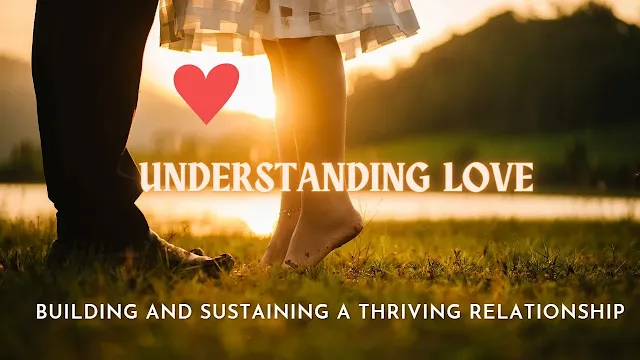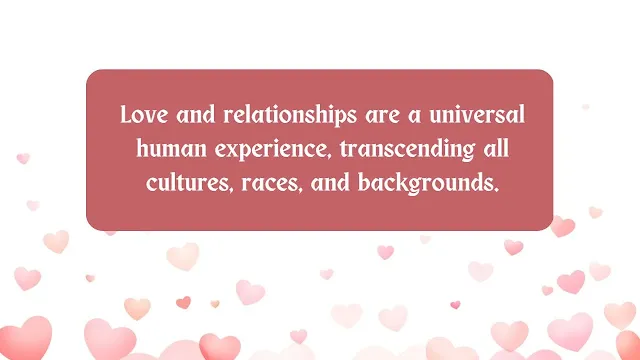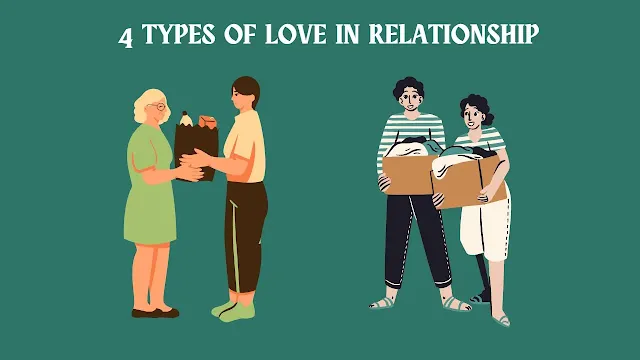Are you still in doubt as to the science of love?
Know upfront that love and relationships are universal human experiences, transcending all cultures, races, and backgrounds. They hold a special place in our hearts and can shape our lives in profound ways.
Love can bring us immense joy, but it can also bring heartache. Relationships can be the source of our greatest happiness, but they can also be a source of conflict and stress.
Despite the challenges, however, the importance of love and relationships in our lives cannot be overstated. They provide us with a sense of connection, comfort, and support, and they help us grow and evolve as individuals.
In this guide, we will delve into the intricacies of love and relationships, exploring what makes them so important and how we can cultivate healthy and fulfilling connections with others.
Whether you are in a relationship, seeking love, or just curious about this fascinating topic, this article is for you. So buckle up, and let's dive into the world of love and relationships!
SUGGESTED READING: 12 Books You Must Read Before Getting Married
Table of Contents
- Definition of Love and Relationship
- Understanding Love
- What are the 3 skills for building healthy relationships?
- Navigating Challenges in Love and Relationships
- Frequently Asked Questions on The Science of Love: What happens to your brain chemistry when you're in love?
- Conclusion on The Science of Love: What happens to your brain chemistry when you're in love?
Definition of Love and Relationship
 |
A relationship, on the other hand, refers to the connection and interaction between two people, whether romantic, platonic, familial, or professional. Relationships can involve love, but they also encompass many other aspects such as communication, shared interests, mutual support, and the building of a bond over time. Relationships require effort, compromise, and a commitment to maintaining the connection in order to be successful.
Don’t waste time searching! Head to our service page for top-quality, affordable content creation and content writing training, web design, copywriting, content marketing, sponsored ads, and graphic design.
What is the importance of love?
 |
- Emotional support: Love and relationships provide us with a source of emotional support and comfort, allowing us to feel valued, understood, and accepted. This can help us cope with life's challenges and feel less isolated and alone.
- Personal growth: Relationships can challenge us to grow as individuals and help us develop new perspectives and ways of thinking. They also allow us to learn from others and expand our experiences.
- Happiness: Love and relationships can bring happiness and joy into our lives, providing us with a sense of purpose and fulfillment.
- Physical and mental health: Research has shown that people in healthy relationships tend to have better physical and mental health, with lower levels of stress and a stronger immune system.
- Sense of belonging: Love and relationships provide a sense of belonging and connection to others, which can be essential for our overall well-being and happiness.
In short, love and relationships are important because they provide us with a sense of purpose, fulfillment, and support, helping us to lead a happier, healthier, and more meaningful life.
PAY ATTENTION: Get daily updates on scholarships, jobs, relevant news updates, crypto news, and business trends. Follow us on Twitter and never miss an opportunity!
Types of relationships in love
There are many different types of relationships, each with its own unique characteristics and dynamics. Some of the most common types include:- Romantic relationships: This type of relationship is characterized by strong feelings of love, affection, and emotional intimacy between two people. Romantic relationships can take many forms, including dating, marriage, and long-term partnerships.
- Platonic relationships: Platonic relationships are close, non-romantic friendships based on shared interests, values, and mutual respect. They can be as close and meaningful as romantic relationships but without the romantic or sexual aspect.
- Family relationships: Family relationships refer to the connections between family members, including parents, siblings, grandparents, aunts, uncles, and cousins. Family relationships are often strong and enduring, based on a shared history and sense of belonging.
- Professional relationships: Professional relationships refer to the connections between people who work together or have a common professional interest. These relationships can be based on collaboration, teamwork, and mutual respect and can be an important source of support and fulfillment.
- Acquaintance relationships: Acquaintance relationships are casual relationships that people form with others they know, such as neighbors, classmates, or coworkers. These relationships are typically not as close or intimate as other types of relationships and are characterized by limited interaction and the limited exchange of personal information. Acquaintance relationships can still be positive and fulfilling and can provide a sense of connection and support. For example, you might enjoy chatting with a friendly neighbor or exchanging jokes with a coworker. Acquaintance relationships can also provide opportunities to network and learn about new things.
Overall, acquaintance relationships can be an important part of our social network, providing us with a sense of community and a source of support, even if they are not as close or intimate as other types of relationships.
What are the 4 types of love in relationships?
- Storge (affectionate love): This type of love refers to the love and affection that naturally develop between family members, such as parents and children, or between close friends. It is characterized by a sense of comfort, familiarity, and ease.
- Philia (Friendly Love): This type of love refers to the love between friends and is based on shared interests, experiences, and values. It is characterized by a sense of trust, mutual respect, and a lack of romantic or sexual attraction.
- Eros (Romantic Love): This type of love refers to the intense romantic attraction between two people. It is characterized by feelings of passion and desire and a deep emotional connection.
- Agape (selfless love): This type of love refers to unconditional love and concern for the well-being of others, regardless of whether or not the feelings are reciprocated. It is often considered the highest form of love and is characterized by selflessness and altruism.
It's worth noting that these types of love are not mutually exclusive and can overlap and interact in complex ways within relationships. For example, a romantic relationship may also involve elements of storge and philia, while a friendship may involve elements of agape. Understanding the different types of love in your relationships can help you understand the dynamics and strengthen your bonds.
PAY ATTENTION: Get exclusive scholarship updates, jobs, crypto news, and business trends. Follow our WhatsApp channel to stay informed!
What is love in a romantic relationship?
 |
| The easiest thing to spread is LOVE. |
In a romantic relationship, love is characterized by feelings of happiness, joy, and contentment, as well as a deep sense of connection and commitment to one another. In a romantic relationship, love often involves a mix of emotional and physical intimacy and a desire to spend time together and build a life together. In a romantic relationship, love can also involve shared experiences, shared values and interests, and mutual support and care.
It's worth noting that love in a romantic relationship can also involve challenges and difficulties. Relationships require effort, communication, and a commitment to resolving conflicts and working through challenges in order to be successful. However, when two people are in love, they are often willing to put in the effort and work to maintain and strengthen their relationship.
Overall, love in a romantic relationship can be a source of happiness, fulfillment, and meaning and can provide a sense of connection and security in an otherwise uncertain world.
What is more important than love in a relationship
While love is certainly a crucial component of any healthy relationship, other factors are also important for the success and longevity of a relationship. Some of these include:
- Communication: Clear, open, and honest communication is essential for any relationship to succeed. This includes being able to express one's own needs and desires as well as being able to listen to and understand the perspectives of others.
- Trust: Trust is the foundation of any healthy relationship and involves being able to rely on each other to be honest, faithful, and supportive.
- Mutual respect: Respecting each other's boundaries, opinions, and beliefs is essential for maintaining a healthy and happy relationship.
- Compromise: Relationships require give-and-take, and being able to find mutually agreeable solutions to conflicts and challenges is key to success.
- Shared values and interests: Having common goals, interests, and values can help strengthen the bond between two people and provide a sense of shared purpose.
- Emotional intimacy: Emotional intimacy involves sharing your deepest thoughts, feelings, and fears with your partner and feeling comfortable being vulnerable with each other.
- Shared experiences: Whether it's traveling, pursuing a shared hobby, or simply enjoying each other's company, shared experiences can help to deepen the connection between two people.
- Commitment: A strong commitment to the relationship and a willingness to work through challenges and difficulties are essential for a relationship to thrive.
While love is certainly an important factor in a relationship, these other elements are also crucial for creating and maintaining a healthy, happy, and fulfilling relationship.
Understanding Love
 |
| Build and sustain a thriving relationship and Love |
- A deep emotional connection: True love is characterized by a strong emotional bond and a feeling of closeness and understanding between two people. When you've found your true love, you feel comfortable and confident being yourself around them.
- Mutual respect and support: True love involves treating each other with kindness, respect, and understanding. You support each other's goals and aspirations and work together to overcome challenges.
- A sense of security: When you've found your true love, you feel safe, secure, and accepted for who you are. You know that you can count on each other through thick and thin.
- Shared values and interests: True love often involves a shared sense of values, beliefs, and interests. When you have found your true love, you enjoy spending time together and having fun doing the things you both love.
- A feeling of completeness: When you've found your true love, you may feel a sense of completeness and wholeness. You feel like you have found a missing piece of yourself and that you can build a happy and fulfilling life together.
It's important to remember that everyone's journey to finding true love is different, and there is no right or wrong way to experience it. If you are feeling unsure about whether you have found your true love, it can be helpful to take time to reflect on your feelings and experiences and seek guidance from trusted friends, family, or a professional counselor.
What are the 5 stages of love?
The five stages of love are typically described as follows:
- Attraction: This is the initial stage of love, where two people are drawn to each other based on physical or emotional attraction. This stage is characterized by feelings of excitement, infatuation, and anticipation.
- Romance: In this stage, the relationship begins to develop and the couple becomes more intimate and emotionally connected. There is a sense of excitement and discovery as the couple gets to know each other better.
- Power struggle: This stage can be challenging as the couple begins to work through any differences and challenges in their relationship. It's common for couples to experience disagreements, arguments, and conflict during this stage.
- Stability: In this stage, the couple has worked through the challenges of the power struggle stage and has developed a more stable and secure relationship. Communication is strong, and the couple feels a sense of comfort and intimacy with each other.
- Commitment: This is the final stage of love, where the couple decides to make a long-term commitment to each other, such as getting married or moving in together. This stage is characterized by a deep sense of love, trust, and understanding and a commitment to build a future together.
It's important to note that not all relationships linearly progress through these stages, and some relationships may not reach the final stage of commitment. The stages of love can also differ based on individual experiences and cultural factors. However, these stages provide a general framework for understanding the development of romantic relationships.
When love hurts a woman's guide to understanding abuse in relationships
Love should never hurt. If you are experiencing abuse in your relationship, it's important to understand that you are not alone and that help is available. Abusive relationships can take many forms, including physical, emotional, psychological, sexual, and financial abuse. Some common signs of abuse include:
- Physical violence: This can include hitting, slapping, pushing, or other forms of physical assault.
- Emotional abuse: This can include name-calling, controlling behavior, isolation from friends and family, and humiliation.
- Psychological abuse: This can include gaslighting, manipulation, and intimidation.
- Sexual abuse: This can include sexual assault, coercion, and unwanted sexual advances.
- Financial abuse: This can include controlling access to money or resources or forcing you to spend money in a way that you are not comfortable with.
If you are experiencing any of these forms of abuse, it's important to know that you are not to blame and that you deserve to be treated with respect and dignity. You have the right to a safe and healthy relationship, and there is help available to you.
Some steps you can take to address abuse in your relationship include:
- Reach out for help: Talk to a trusted friend, family member, or professional counselor about your situation. They can provide support and guidance on how to stay safe and get the help you need.
- Create a safety plan: Make a plan for how to stay safe if you need to leave the relationship. This can include packing a bag with important items, finding a safe place to go, and telling trusted friends and family about your situation.
- Seek legal assistance: If you are in immediate danger, call the police. You can also seek assistance from a domestic violence advocacy organization, which can provide resources and support for survivors of abuse.
- Focus on your self-care: Taking care of yourself is important, both physically and emotionally. Engage in activities that bring you joy, such as exercise, spending time with friends, or reading a good book.
Remember, abuse is never your fault, and you deserve to be in a safe and healthy relationship. With the right support and resources, you can take steps towards a brighter future.
What is platonic in a relationship?
A platonic relationship is a type of relationship that is characterized by a close friendship between two people without any romantic or sexual feelings or involvement. Platonic relationships are based on mutual respect, trust, and shared interests and values.
In a platonic relationship, both individuals are free to be themselves and can enjoy spending time together, whether it's talking, going out, or engaging in common activities. The focus is on the emotional and intellectual connection between the two individuals, rather than a romantic or physical connection.
Platonic relationships are an important part of many people's lives, as they can provide a supportive and fulfilling connection with another person. Platonic relationships can also be a source of comfort and understanding in times of need.
It's important to note that while a relationship may start off as platonic, feelings can change over time. If this happens, it's important for both individuals to have open and honest communication about their feelings and to consider what is best for the relationship moving forward.
READ ALSO: 12 Tips to Find Balance in the Social World as an Introvert!Is there kissing in a platonic relationship?
In a platonic relationship, kissing may or may not occur. It ultimately depends on the individuals involved in the relationship and their personal boundaries and comfort levels.
For some people, kissing can be an expression of affection and friendship without any romantic or sexual undertones. For others, kissing may not be part of their definition of a platonic relationship.
It's important for individuals in a platonic relationship to have open and honest communication about what is and isn't acceptable for them in terms of physical affection. This can help to maintain the platonic nature of the relationship and ensure that both individuals feel comfortable and respected.
Ultimately, whether or not kissing is part of a platonic relationship is a personal decision that should be based on the preferences and comfort levels of the individuals involved.
Is platonic relationship good?
Yes, platonic relationships can be very good. Platonic relationships are based on mutual respect, trust, and shared interests and values, and they can provide a supportive and fulfilling connection with another person.
Platonic relationships can be a source of comfort and understanding in times of need and can also bring a lot of joy and positivity into our lives. Having a close friend with whom you can talk and share experiences can be incredibly valuable and can help strengthen our emotional well-being.
Platonic relationships can also provide opportunities for personal growth and self-discovery, as we can learn from the perspectives and experiences of others.
It's important to note that while platonic relationships can be very beneficial, they can also have challenges and conflicts, just like any other type of relationship. Good communication and mutual respect are key to maintaining a healthy and fulfilling platonic relationship.
SUGGESTED READING: 12 Books You Must Read Before Getting Married
Can you be platonically in love with someone?
Yes, it is possible to be platonically in love with someone. Platonic love refers to a deep and non-romantic affection that two individuals have for one another. It can involve feelings of love, affection, respect, and admiration but does not involve a romantic or sexual component.
Platonic love is often associated with close friendships and can be just as strong and meaningful as romantic love. Platonic love can bring joy, fulfillment, and a sense of connection to our lives and can provide a strong support system in times of need.
It's important to note that while platonic love can be very fulfilling, it can also have challenges and conflicts, just like any other type of relationship. Good communication and mutual respect are key to maintaining a healthy and fulfilling platonic relationship.
Can platonic love be romantic?
Platonic love is a type of love that is non-sexual and focuses on a deep affectionate bond between two individuals. While it is typically considered non-romantic, it can still contain elements of romance in terms of the emotional connection and caring nature of the relationship. However, it's important to note that platonic love is distinct from romantic love, which is typically characterized by strong feelings of romantic attraction and a desire for a romantic relationship.
Ultimately, the definition of "romantic" can vary from person to person, and some people may consider platonic love to be romantic if it has enough of the emotional and intimate elements of a romantic relationship, even if there is no sexual component.
What are the 3 skills for building healthy relationships?
 |
| Love quote |
1. Communication skills for a successful relationship
- Active listening
- Expressing feelings and needs
- Resolving conflicts effectively
- Being respectful and avoiding criticism and negativity
- Being open to compromise and negotiation
- Asking for clarification when necessary
- Being able to express gratitude and appreciation
- Being willing to admit when you are wrong and apologize
- Giving your full attention when the other person is speaking
- Showing empathy and understanding of your partner's perspective.
Having good communication skills is crucial for maintaining a healthy and fulfilling relationship. When both partners are able to communicate effectively, they can build trust, understanding, and intimacy and are better equipped to handle any challenges that may arise.
2. Trust and commitment in a relationship
- Building trust through actions and words
- Maintaining commitment through mutual support and effort
- Keeping promises and following through on commitments
- Being honest and transparent in all matters
- Allowing each other space and freedom while still being there for each other.
- Being willing to forgive and move past mistakes
- Making an effort to maintain and strengthen the relationship
- Respecting each other's privacy and individuality
- Encouraging each other's personal and professional growth
- Celebrating each other's successes and supporting each other through challenges.
Having trust and commitment in a relationship is essential for it to thrive and grow over time. When both partners are committed to building and maintaining a strong, healthy relationship, they can overcome challenges and deepen their connection and intimacy.
3. Managing expectations and differences in a relationship
- Understanding and accepting individual differences
- Establishing realistic expectations and boundaries
- Being open to compromise and negotiation
- Being willing to see the other person's point of view
- Being able to communicate effectively about expectations and boundaries
- Finding common ground and shared interests
- Encouraging each other's growth and individuality
- Being willing to work together to resolve conflicts
- Recognizing and respecting each other's needs and wants
- Celebrating each other's strengths and differences.
Managing expectations and differences is a crucial aspect of any relationship, as it helps both partners understand and accept each other, even in the face of disagreements. By having a clear understanding of each other's expectations and boundaries and being open and willing to work through differences, partners can build a stronger and more fulfilling relationship.
SEE ALSO: How to Talk to Anyone: The Secret to Better Communication
Navigating Challenges in Love and Relationships
Common challenges in relationships
- Miscommunication and misunderstandings
- Jealousy and insecurity
- Differences in values and beliefs
- Lack of trust
- Different expectations and goals
- Money and financial issues
- Intimacy and physical affection
- Differences in personality and communication styles
- Balancing personal time and time together
- Dealing with past traumas and relationship baggage.
2. Coping with relationship challenges
- Seeking support from trusted friends and family
- Seeking professional help, if necessary
- Taking time to reflect and grow as individuals
- Effective communication and active listening
- Being honest and open with each other
- Practicing empathy and understanding towards each other
- Making time for fun and enjoying each other's company
- Compromise and negotiation
- Building and maintaining trust through consistency and transparency
- Working together to find solutions and overcome challenges
Frequently Asked Questions on The Science of Love: What happens to your brain chemistry when you're in love?
What happens in our brain when we are in love?
When we are in love, various regions of our brain become active. The brain releases chemicals such as dopamine, oxytocin, and serotonin, which contribute to feelings of happiness, pleasure, and bonding. Brain imaging studies have shown increased activity in areas associated with reward, emotion, and attachment, such as the ventral tegmental area (VTA), the nucleus accumbens, and the prefrontal cortex. These changes in brain activity result in the intense emotions and strong connections typically associated with romantic love.
What happens chemically when you fall in love?
Falling in love involves a complex interplay of neurotransmitters and hormones. Dopamine is a key player, causing feelings of pleasure and excitement. Oxytocin, often called the "love hormone" or "bonding hormone," fosters emotional attachment and intimacy. Serotonin levels can also fluctuate, affecting mood and obsession-related behaviors. These chemical changes in the brain can lead to infatuation, increased energy, and a preoccupation with the person you're in love with.
What chemical in your brain gives you love-like feelings?
The chemical primarily responsible for love-like feelings is oxytocin. Oxytocin plays a crucial role in forming emotional bonds and social connections. It is released during various social interactions, not just romantic ones, and contributes to feelings of trust, empathy, and attachment. Additionally, dopamine and serotonin also play significant roles in creating pleasurable and rewarding sensations associated with love and attraction.
What triggers attraction in the brain?
Attraction in the brain can be triggered by a combination of factors, including physical appearance, shared interests, personality traits, and even pheromones. The brain processes visual cues when assessing physical attractiveness, and certain facial features can be particularly appealing to different individuals based on their preferences and cultural influences. Shared interests and personality traits can create emotional connections, and pheromones may play a role in subconsciously signaling compatibility.
What makes someone fall in love with you?
Falling in love is a complex and individual experience, and there's no guaranteed formula to make someone fall in love with you. However, building a deep connection based on trust, mutual respect, communication, and shared experiences can increase the likelihood of someone developing romantic feelings for you. Being yourself, showing genuine interest in the other person, and allowing the natural progression of a relationship are important factors. Chemistry and attraction are also crucial, but they can't be forced; they tend to develop organically over time when there's compatibility and shared emotional connection.
Conclusion on The Science of Love: What happens to your brain chemistry when you're in love?
Love and relationships play a crucial role in our lives, providing emotional support, companionship, and fulfillment. Throughout this blog, we discussed the common challenges faced in relationships, including miscommunication, jealousy, differences in values, a lack of trust, and more. We also explored coping strategies for overcoming these challenges, such as seeking support, effective communication, empathy, and compromise.Maintaining strong and healthy relationships is vital for our overall well-being and happiness.
Relationships can help us grow as individuals, challenge us to become better versions of ourselves, and provide a source of comfort and security.
However, they also require effort, patience, and the ability to work through challenges. The key is to communicate openly and honestly, to seek support when needed, and to make time for fun and enjoyment.
We hope that this guide has provided insight and inspiration for you to prioritize and value your relationships. Whether you are in a romantic partnership, a friendship, or a familial bond, it is essential to invest time and effort into maintaining these relationships.
So, I encourage you to take a step back, reflect on the relationships in your life, and make a conscious effort to strengthen them. Remember, love and relationships are gifts, and it's never too late to start investing in them.


